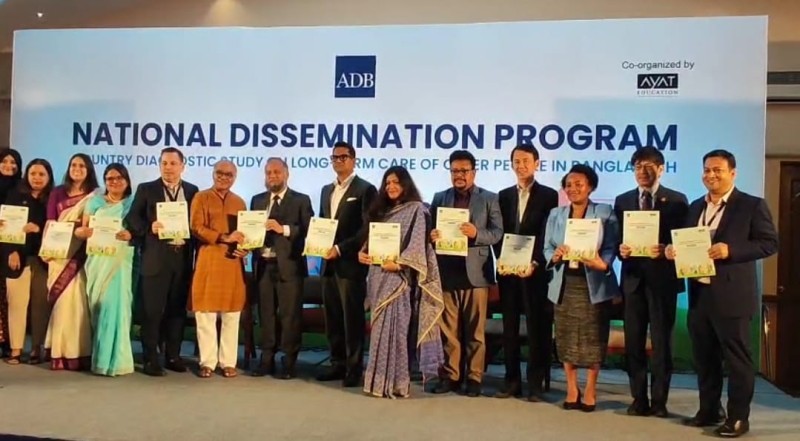- Logi-boitha of 2006 was the 1st reflection of Hasina’s fascism: Rizvi |
- Economists express concern over bank merger; BB remains confident |
- No response on request for Hasina’s extradition: Touhid Hossain |
- Deep relations with US, economic ties with China: Touhid |
- Recommendations on July Charter implementation submitted to CA |
ADB urges action for inclusive long-term elder care in Bangladesh

ADB urges action for inclusive long-term elder care in Bangladesh
With Bangladesh’s population ageing faster than ever before, national policymakers, development partners, and civil society leaders have joined forces to outline a comprehensive roadmap for long-term care (LTC) at a high-level seminar held at the Lakeshore Grand Hotel in Dhaka.
The event marked the official launch of the country’s first Country Diagnostic Study (CDS) on Long-Term Care for Older People, jointly conducted by the Asian Development Bank (ADB) and the AYAT Education Foundation. The study provides evidence-based recommendations to develop a gender-responsive, affordable, and people-centred care system for older persons in Bangladesh.
Dr Mohammad Abu Yusuf, Secretary of the Ministry of Social Welfare, reaffirmed the government’s commitment to policy reform, noting that long-term care is becoming an integral part of Bangladesh’s broader social protection strategy.
“Public–private collaboration will be key to implementing a national framework that works,” he said, stressing the importance of awareness and a shift in social attitudes.
He also drew attention to the country’s health challenges, observing that while overall life expectancy has improved, healthy life expectancy is on the decline. “Life expectancy has increased but our healthy life expectancy is decreasing, which we need to address,” he said, calling for innovative funding mechanisms and practical health models.
Akira Matsunaga, Deputy Country Director of ADB Bangladesh, described Bangladesh as standing at a demographic crossroads. “Building a resilient and inclusive long-term care system will not only support ageing populations but also create new opportunities in the care economy,” he said.
The CDS highlights the urgency of the situation: Bangladesh’s population aged 60 and above is projected to rise from 13% in 2020 to over 30% by 2050. Traditional informal caregiving—largely provided by unpaid female family members—can no longer meet the rising demand. The report calls for a coordinated, multi-sectoral approach to establish a formal care ecosystem integrated with health, welfare, and gender policies.
“This is a defining moment,” said Tahsin Aman, Chairperson of AYAT Education Foundation. “We must grow as a nation not only in numbers or economy, but in compassion and care. Investing in LTC is both a moral duty and an economic opportunity.”
Presenting key findings, Nasheeba Selim, Principal Social Development Officer (Gender) of ADB Bangladesh Resident Mission, and Imran Chowdhury, National Aged Care Consultant, ADB, and Chief Operating Officer of AYAT Education Foundation, outlined critical policy priorities. These include a National Long-Term Care Policy and Strategy, investments in care workforce development, integrated health and social care systems, and innovative financing mechanisms to ensure accessibility and sustainability.
Panelists further called for developing contributory social insurance schemes, fostering public–private partnerships, and integrating LTC into existing social protection systems.
The ADB study recommends that the National Long-Term Care Policy and Strategy be aligned with Bangladesh’s Eighth Five-Year Plan, the National Policy on Older Persons, and the National Women Development Policy.
As Bangladesh faces a major demographic shift, the message from the event was clear: the time to act is now. With the right vision, investment, and coordination, Bangladesh can build a care system that safeguards its elderly, empowers women, and prepares society for a more inclusive future.

